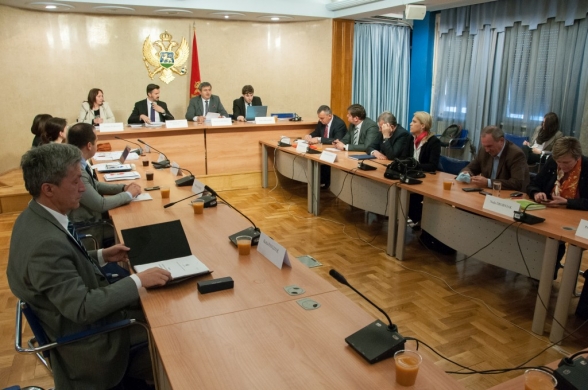At today’s meeting, Mr Aleksandar Andrija Pejović, State Secretary and Chief Negotiator for Negotiations on Accession of Montenegro to the EU, presented the Appendix to the Progress Report on Montenegro by the European Commission. He pointed out that the said document represented a significant, but not the only source, from which the European Commission drew its information for compiling the annual Progress Report on Montenegro in the accession process. Speaking of the contents of the document, he pointed out that it consisted of three parts, relating to political and economic criteria, as well as the ability of undertaking the obligations stemming from membership, where the information on implemented activities in the reporting period was presented. .
After Ambassador Pejović presented the most significant legislative amendments within the certain negotiating chapters, the MPs were interested in specific issues in the field of regional cooperation, combating money laundering and financing terrorism, combating corruption, as well as in the field of transport policy. Ambassador Pejović thanked the MPs for their useful suggestions and comments, which would be incorporated in the next Appendix to the Progress Report, pointing out the significance of the decision of the Committee on European Integration to consider this type of documents.
In continuation of the meeting, a member of the Negotiation Group for Chapters 23 and 24 Ms Svetlana Rajković, Head of Working Group for Chapter 23 Ms Branka Lakočević and Head of the Working Group for Chapter 24 Ms Mira Cerović presented the quarterly reports on implementation of the action plans for negotiation chapters 23 and 24. It was pointed out that the practice of quarterly reporting was introduced as an additional mechanism of monitoring of implementation of obligations from the action plans. It was pointed out that greater engagement was needed regarding increasing quality of implementation of envisaged measures in the following period.
In this part of the meeting, they pointed out the fact that numerous obligations presented in the action plans were very complex, that they horizontally included multiple areas, and that they required communication and coordination of various state authorities. During the discussion, special focus was placed on considerable assistance by experts, hired by the TAIEX missions, in order to enhance legislative acts in the field of judiciary.
The meeting was attended by the representatives of the Committee on Political System, Judiciary and Administration, members of the Working Group for Chapter 24, as well as representatives of the Ministry of Foreign Affairs and European Integration.









